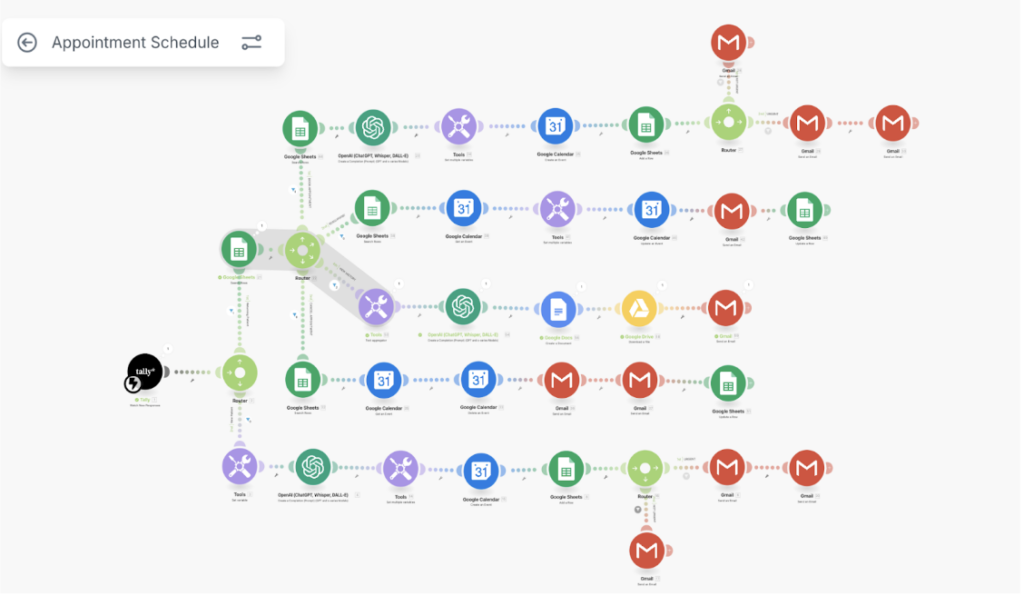In the fast-paced environment of healthcare, administrative inefficiency isn’t just an inconvenience, it’s a barrier to patient care. While simple automation handles repetitive tasks, the future of hospital operations lies with AI Agents: intelligent systems that can perceive, reason, act, and learn within a workflow.
Unlike single-purpose chatbots, AI Agents can manage complex, multi-step processes that require decision-making. By leveraging tools like low-code platforms and powerful AI models, these agents are becoming accessible and transformative. In this post, we’ll explore how AI Agents are being deployed to tackle some of the most persistent challenges in hospital administration.
What Are AI Agents in Healthcare?
Think of the difference between a simple instruction and a trusted employee. A basic automated tool might send a reminder email at a set time. An AI Agent, however, is given a goal—like “schedule this new patient appropriately”—and then independently executes a sequence of steps to achieve it. It can analyze information, make judgment calls using AI, and adapt its path based on real-time data.
Unlike traditional automation tools that simply follow predefined steps, AI Agents are dynamic. They can:
- Interpret context from unstructured data.
- Make decisions based on real-time priorities.
- Interact with other digital systems and even escalate urgent cases automatically.
Case-Study: Patient Scheduling Made Smarter
In our full case study, we built an AI-powered scheduler using low-code automation, AI triage, and smart reminders. This prototype showed how automation alone can save staff time and improve patient experiences. But imagine upgrading this workflow into an AI Agent:
- Instead of simply categorizing cases as “urgent” or “not urgent,” the agent could monitor doctor availability and suggest alternative hospitals in real time if capacity is exceeded.
- The agent could automatically coordinate transport options for critical patients, linking with ambulance dispatch or telemedicine support.
- For follow-ups, the agent could proactively remind patients about lab tests, medication schedules, or vaccination timelines, ensuring continuity of care.
By giving the scheduler autonomy, it evolves from a useful tool into a self-directed hospital assistant.
For a deep dive into the architecture and development of this high-impact solution, you can read the full blueprint here: Full Post: Building an AI-Powered Patient Scheduler.

The core automation powering the AI patient scheduler. This Make.com workflow visualizes the entire process, from initial data capture to the intelligent routing that ensures both patients and hospital staff receive timely, context-appropriate communications.
Other Opportunities for AI Agents in Hospitals
The same principles can be extended beyond scheduling:
- Triage and Emergency Routing
AI Agents can quickly assess patient symptoms submitted through digital forms or telemedicine platforms and automatically escalate cases to the right department or staff team. - Inventory and Supply Chain Management
By monitoring usage patterns, AI Agents can reorder essential supplies (like blood units or medication) before shortages occur. - Patient Communication
AI Agents can act as 24/7 virtual assistants—answering common questions, reminding patients of appointments, and sharing post-care advice, reducing the pressure on call centers. - Operational Analytics
Agents can continuously analyze hospital data (admissions, wait times, no-show rates) and surface insights to administrators, enabling data-driven decision-making.
Why This Matters for Africa
Hospitals across Africa often face unique challenges: staff shortages, overwhelming patient volumes, and limited infrastructure. AI Agents can act as force multipliers, ensuring that scarce human resources are deployed where they are needed most.
CipherSense AI is particularly focused on developing AI built on local context, solutions that understand the region’s unique data, workflows, and challenges. Deploying AI Agents tailored for African healthcare systems could dramatically improve efficiency, patient satisfaction, and ultimately health outcomes.
Conclusion
The AI-powered patient scheduler is just the beginning. As AI Agents mature, we can expect healthcare systems to evolve into self-optimizing ecosystems where routine tasks are automated, urgent cases are prioritized instantly, and administrators gain the insights they need to plan strategically. Hospitals of the future won’t just adopt AI, they will rely on AI Agents as critical members of their operational teams.
🔗 Explore the full patient scheduler case study here to see how the foundation has already been laid.
Ready to explore how Agentic AI can drive enhanced outcomes for your hospital operations? Contact us today to schedule a consultation and discover the future of innovation.

